We met in the Martyrs of Alamar mortuary. Her father had died that afternoon, I’d come in to drink no less than ten coffees on the cheap. I needed them to ease my anxiety, ease my anxiety, ease my anxiety. My nights were long, too long to endure. Blind tunnels until little after dawn, when I managed at last to find myself in a park; only so a swarm of uniformed children could jostle me next, blowing to smithereens my only winks of the day — the week, the month, or perhaps the millennium. Of course, on that first Friday she didn’t call herself Ipatria yet. I saw her sitting like a mortal, alone in the ’Ch’ chapel, scarcely a few feet from the cafeteria where my nerves overloaded. Not even her dead father accompanied her between the candles and the blackout. Afterwards I learned that she herself had ordered a second and a third and a fifth and a tenth autopsy: Ipatria distrusted or “no, now I don’t distrust“, she would confess to me afterward: “now I’m very sure of what’s happening …” The absence of a casket was the first thing that caught my attention. Then her foreign black hair, falling into neglect on her bird-like shoulders: her immobile ebony hair, or of araucaria or cypress. And then it was her chapped voice, prickly, when she called me without looking at me, bluntly: “Come here” (like to a dog). And I went toward her (like a dog), thus ruining forever my somnambulatory routine, for the first time obedient in the anarchic midnight of a worker’s cemetery called Alamar. “Sit“, she ordered, and put me in front of her face. She had extremely black eyes, even more so than her hair: from a nightless night, starry and tattered, and I adored that tiny little bit of shadow in her pupils between terror and blackout. “Do you come from abroad?”, she asked me. “From where, outside?”, I asked her. “From the Cuban night“, she said to me. “I suppose so“, I told her. “And have you seen it? Did you hear it?“, she shook me. “Seen and heard what?”, I withdrew from her attack. “You freak!“, she pushed me until I nearly fell to the ground: “The wingbeat of the vulture, what else could it be?” Then she made a grimace and hid her face: she was horrified to have spoken more. She pretended to cry but neither did she manage to do so. She looked at me with hatred, as if I’d betrayed her secret. I managed nothing. I liked to imagine her crazy from the beginning. “Please“, I calmed her: “there have never been vultures in Alamar“, and I grabbed her by the belt. “Or they went extinct at the beginning of the Revolution“, and I gave her a hug. Blindly. She trembled. Her vibrations transmitted themselves to me. I trembled too. We looked like a pair of epileptics waiting for the casket in which one of the two of us was going to lay down. Then she took her hands from her face and separated me from her body. Her voice returned to being prickly, sliced up, and she dismissed me without looking at me, bluntly: “Split” (like to a dog). So I turned, for the second time obedient (like a dog) and began walking down the hall, returning to the mortuary’s cafeteria where, in spite of the triumphal lack of electricity, the custodians still insisted on straining their coffee. Black smoke inside a bigger cloud of smoke. To be sure, that first Friday Ipatria never called herself by that name. That December 3rd I left her without knowing her name, a terrible key to penetrating her head, to sneak inside her brain, lightly scratched by the sandpaper of Chilean history and its tyrannies: wet waiting room to her now dried up sex through so many tears repatriated in Cuba.
The second night was in a tan M -1: pink tin can metrobuses rolling even in a full blackout. She was seated on the steps to the rearmost door, her knees contained by the circle of her hands and the tangle of her hair, in which that night a flower was sunk like an explosion of white. It looked like a fistful of petals with a pistil: a marpacifico, I thought. Although I realized right away it was not: “it’s not alive, moron“, she ridiculed me, “it’s just a piece of plastic, Made in Chile, wholesale.” I kept staring at her for the next couple of stops of the M-1, during three or perhaps thirteen kilometers of the Via Blanca, remembering her again in the funeral home, meeting her again for the second Friday in a month. When the Metrobus started to pant up Cojimar Hill, I dropped next to her on the seats: among bags, lit cigarettes, farm animals, calves, or on barbs. “I’m Sagis“, I ventured. She looked at me, perhaps remembering me from another time in the funeral home, or recognizing me for the second Friday in the millennium. Then she smiled. “Sagis is a name for a mutt, not for people,” and she aimed at me with her left index finger, a long gun complete with bayonet of a fingernail painted white, a petal no less artificial than her imported flower. “My real name is Salvador,” I admitted. But she was unsatisfied: “Salvador is much worse.” And she turned serious: “Surely you were born after ’73.” Her guess left me gob-smacked. “Almost,” I confessed, “December 10th, 1973: I suppose today is my birthday,” and I felt ridiculous in my pathos. Luckily, she looked at me compassionately. With patience. And she returned to smiling for me. Between the kicks from the crowd shone something even more beautiful than the nonexistent box at the chapel. Night was falling. I’d now gone through seven dawns without sleeping since that one in which I bumped into her. Back then I thought I would not see her again — perhaps due to my stupid habit of continually circling the Martyrs of Alamar mortuary, as if her father could die twice in a week and through a paranoid cascade of autopsies. There was an infernal noise under our feet, including white smoke from the motor. I couldn’t stop looking at her while she lectured me: “In December of ’73 I too had had your name, but I was born a few months before“, she shrugged her shoulders, as if they were wings. “Our parents were obsessed with the presence or the presidency of some Salvador,” she said for fright effect and public entertainment in the shadows of the Metrobus. And I loved her vocabulary of political evangelism so much that … I don’t know … the vehemence of her brilliant oratory cast a spell on me. I managed to tell her how much I’d been intrigued by our purely random encounters, and that I didn’t want to lose her again. Because, from that point on, I slept less and as a consequence, my anxiety was worse, my anxiety was worse, my anxiety was worse. “Happy birthday and goodbye, old man“, she gave me a kiss on each cheek. And next she told me no, that it was not possible for me to see her and that she deeply regretted it, but she repudiated coincidence and fate, and I exactly embodied coincidence and fate: which was too suspicious for her intuition. “A power with memory could use anyone to detect you“, she said. She distrusted. Or not, no longer mistrusted: “now I’m not sure what happened,” she said in a whisper. And my ignorance did not guarantee my innocence: that someone from the military junta, for example, might be handling me like a civilian puppet. With me she could never be safe: “I’m very sorry, whether you be Sagis or Salvador, you are too innocent to be not guilty” was her conclusion. “But safe from what?“, I became impatient. And now she almost looked at me with compassion. “Please, safe from a motherland: from Alamar, from a vulture, from the night, and from you“, she told me, and jumped with the door half-open, still stopping our M-1. She escaped from crevices, among the echos of her own enumeration. Like one of the vermin of the night, angelic and frightening creatures, without giving me time to act: to hunt her and really threaten her with death, to see if the she really reacted to me. I looked outside for an instant. I saw her running. I saw her back about to take off, silhouetted against a lunar landscape in permanent revolution. We were in the old Chilean neighborhood: a wasteland even more deserted than the rest of Alamar and perhaps the rest of the country. Chile, Cuba, Santiago de la Habana: how can you tell the difference under the dead gaze of unlove? Besides, no one ever got on or off at that bus stop, out of fear of the legends that, for more than ten years, laid waste to those buildings through sudden repatriation: clandestine mass flight without apparent cause, that made Cuban Chileans invisible in just a few days at the end of the 80s. In Chile democracy finally returned and no one wanted to continue living in Revolutionary Cuba. continue reading
3. They extracted the shadow from the shadow, drew a wind with fangs
Nonetheless, the following Friday I got off right there, after all my cheap coffees in the Martyrs of Alamar. I needed to see Ipatria, if only to lose her again. Her turf was a rocky desert of high salinity, between dirty nondescript buildings and faded walls: on all of them was the same old blind man, in a suit and tie, but wearing a hard hat and, in his left hand, a machine gun pointing skyward, as if signalling surrender or perhaps actually surrendering. I crossed the basketball court laid waste from the 11th School Festival. I crossed the overgrown baseball diamond next to where the drug dealers ply their wares. And I crossed the ghetto deserted by the Chileans at the end of the 80s, who returned in a stampede to their continental island bounded by the Atacama Desert, the Antarctic ice, the Andes ridge, and the voracity of the Pacific. Without gas, without light, without telephone, nor identity documents; expecting the denouncement that would return them to their province of birth, like springs, to reorganize their teeming families and relocate to the capital between mouthfuls of prú and drum beats. Then I bumped into her. Ipatria remained immobile, addressing no one in a loud voice: making speeches, sitting on the shoulders of that old salt-corroded bust, at which we all poked fun as children, without having to ask one’s later adult self what kind of lonely that guy would have to be. The lack of lighting reduced them both to a shadow puppet: the statue standing, Ipatria sitting on top, reciting — straddling the statue — what seemed like verses. She broadcast them without noticing the absence of her public. I paid attention: “In the deepest region of the motherland“, with me still getting closer to the pair, “where the puma growls and the condor cries“, her fingers as tense as claws, “injured by iron and dust“, I stopped next to the pedestal, “the rocks, the dead, the urns“, she covered the eyes of the bust and held it by the chin, “covering themselves in dust and black roots”, as if protecting it from the truth or seeking to be protected by it, “while the flag is hung between two buildings“, I noticed that her block was escorted by two vandalized buildings, “and inflated their cloth like an ulcered belly, a teat, or a circus tent“, and then Ipatria curled herself up on the corroded head of the martyr as if she were finally going to give it birth or perhaps abort it. I applauded, solemnly, trying not to appear sarcastic. I was fascinated by the staging, and also by the right angle at which her legs opened on the statue’s metallic nape, be it copper or brass. It looked like she was determined, because she attacked me right away. “I was waiting for you, Sagis or Salvador, and getting used to a persecution is the same thing as letting myself be trapped“, she said between rage and complaint, “so it seemed to my father and, you know, the consequence was fatal“. I didn’t understand and it wasn’t even important that I understand; the facts were enough for me. We were there by coincidence: wasn’t it perfect? “No, first it’s pathetic, and afterward it’s very dangerous“, she despaired, “You don’t know anything and it’s not important that you know“. “Life is today“, I justified myself with a sureness I didn’t have. “Look, moron“, her voice split out, “they killed our parents, they killed our children, they killed the streets, the trucks, the silent earth” — they seemed like verses to me again — “they killed those who are, those who know, those who feel, they killed the house, the casket, the president’s forehead, they’re going to kill me and I don’t care … what could it matter to you?” By my expression, it was obvious that it meant nothing. “They’re already here!“, she yelled, on the edge of hysteria. “Power tracks us by telepathy. From the Elqui Valley they know everything: from that spiritual center they smell us like rats until they crush our memories first, and the rest of the head afterward. It’s a holocaust from an eyedropper.” For me that was enough. I exploded “But who are they? Fuck!“, I slugged the bust and I grabbed it by the calves, trying to drop her from that insane platform by force of sanity. She meant to defend herself with that look of hers so vacant of chaos and significance; but it didn’t matter to me any more. With a tug I knocked her down, and with the momentum from the fall, we rolled around on the gravel of what, ten years before, well could have been the luxurious garden of some uppity-up in the Chilean Communist Party. We stood at the feet of a trunk with a memorial plaque — it was an imported poplar planted in 1970-something, I read through the rusty metal, by some I-don’t-know-who antifascist poet, even if the monument were only a plaque on a stump. “What’s happening with you, nut?” She kept silent. “What’s up with you, Ipatria?” She kept silent. “What’s happening with you, my love?” She kept silent. And then I jumped on her hips and planted myself there. And I shook her like a rabid animal, trapping her under my weight and moving myself almost at top speed against a resistance that, at the end, never came up: she always maintained her silence. I had an obscene erection that I couldn’t hide, but the more I knelt the more my lump between her legs grew. I went to kiss her on the mouth and she spat at me. I yelled “What the fuck is happening with you, whack job? Does torture panic you?” Ipatria gritted her teeth, I loved her absolute vulnerability. I felt like fucking her right there. “What’s wrong? Isn’t betrayal better after making love?” And then, at last, she reacted: she simply fainted. That was the triumph of her defense, and also my humiliation as an imbecilic national executioner. I lost my erection and my muscles all relaxed, so did my brain; saturated with greed, shame, and funerary coffee. I felt ashamed: I blamed myself. I could have run, but shame paralyzed me. I realized the only whack job in those Friday scenes had been me, that I almost destroyed the only one who looked at me even once during those insomniac nights. I wanted to sing to her, beg her forgiveness; and I sang to beg her pardon. I whispered some nursery rhymes to her, as tender as they were theatrical: they were the only ones I knew, although with mistakes: “Give me your hand and we’ll dance, give me your hand and you’ll love me”, I sang for Ipatria, as out of tune as I couldn’t avoid: “because we’ll be in the dance as a horror and nothing more“. A bird passed over us and squawked – or maybe it was a bat: how could I tell the difference in a half-blackout? It was scary, too. I stopped singing and I sat by her side hoping she’d come to. I was afraid she was suffocating, and I gave her a mouth-to-mouth respiration from the bottom of my lungs. Ipatria started to breathe better, she recovered the discolor of her perfect skin, and in a little bit she was conscious again, almost hugging me. Her long shawl of white cloth, like nylon, was precious to her. She seemed like a bird of prey who they’d made fly until she fell, exhausted. She had drool around her mouth that she took off, and drew back a lock of hair that was hiding her eyes. She looked at me with a hidden peace. Her forehead was sweaty in spite of the cold. Could she be epileptic? And then I don’t know if she gave me an order or begged me: “Sagis or Salvador, take me to the beach now“. And I carried her to the shore: the sterile eroded limestone of La Playita de los Chilenos. The moon came out from between the roofs and rebounded right away to its zenith, through clouds of ruby-red cotton wadding. I kneeled with Ipatria in my arms, that’s what Ipatria would call it at last, incapable of throwing her into the water and me with her, washing away her panic and my anxiety. I carefully deposited her to where the foam came up. The shadow of that stupid bird followed us all the time — it had a very long neck, like a cannon, and circled in ever-widening circles in a counterclockwise direction until its turns faded into the dawn, thus marking the end of that Friday the 17th that would never become Saturday in my memory. I went to kiss Ipatria on the mouth. It was barely a touch, or even less, a premonition. Her breath was warm and gentle, but also very deliberate and cold, without paradox or contradiction. I smelled strange fermented fruit. I extended my hands in a farewell gesture, but in reality I was asking that, at least for just one night, neither of us would say goodbye. But I saw her smile without moving a single muscle in her face; something sinister that made clear, without the need for words, that her body was telling mine that I shouldn’t follow her there, that I wouldn’t follow her.
4. I stopped at the chapter of your heroes, in a loud voice I read out the page of your wines.
The 24th was our worst night. The glow of so many bonfires by the block, uselessly pushing back against the blackout moved me: the anguish froze on my cheeks and wouldn’t let me participate in that spectacle. I was walking underneath the blind traffic light of Via Blanca (White Way) — which had become “Dark Way” by then — and thought about Ipatria’s fate a week before: a limp cat between my arms and the limestone, as tense as a lyre untuned from music and from dread, with fists and face twitching from who knows which nightmare, half insurgent and half official. In the traffic stand a cop was snoring, only lit by a candle and using a red-lettered newspaper in place of a blanket: “El Mercurio”, I could read. On his little battery-powered radio he was still mis-hearing a baseball game. From the National Stadium, the only place with lights in the neighborhood, the Metropolitans were losing, as usual, by an embarrassing score. The sportscaster was talking about “one last chance for the capital’s Red hope” and I followed at length towards Siberia, Alamar’s ground zero: by this time I wanted to return to my hiding place before midnight could so sadly surprise me in the middle of the people’s Christmas Eve. They’re here! I was remembering Ipatria’s babbling just seven nights before, * where “they” were the “provocateurs of the VOP and the MIR, and the cadavers from El Caluche** resuscitated at Villa Grimaldi, and the Coachman of Death giving a ride to the Radical Agitators and those of Plan Z and Plan A hand-in-hand with the mummies of the Concertatión and the Chicago Boys of Senator Vitalicio, and the monks from Colonia Dignidad, and those of the Right Province, and those of Fatherland and Freedom, and the Mechanics’ School”, I told myself, “and the vultures from the tacnazo and those of the tancazo“,*** until it was literally impossible to retain so many names, aliases and last names picked out from her moon rock teeth: “Veaux, Mongliocchetti, McAntyre, Lotz, von Schouwen, Ayrwin, Edwards, Salvattori and Superonfray”, among so many of the Broken or Red Spring * — I now didn’t understand very well – in what seemed to be another nursery rhyme in the style of “give me your hand and you’ll kill”. But neither was there anything to understand in Ipatria, who perhaps would never call herself by that name. It was enough to breathe her ketonic breath to understand the desperate brilliance of her nerves, as long and fragile as her extremities. And so cold. On that Friday the 24th, the darkened buildings looked like hillocks from the Jurassic Era: elemental geometry without memory nor amnesia. A half block before reaching my shelter, I saw her, seated on the curb, underneath a banner proclaiming faith in, or at least fidelity to, the future. She was shaven clean bald, and apparently waiting for me. I recognized her right away: the languid color of her skin gave her away, like a neon explosion imported from some cyanotic Patagonian peak. I felt euphoria on seeing her: an irrepressible joy in half step or half silence. And I laughed, arriving at a jump in front of her, who responded with a serious air — as if our luck meant nothing precisely because it meant so much. Thus, for the first and only Friday, I could review the neurotic map of her handwriting. Ipatria had written: “a bird given to intemperance turned into a soft forest and nothing — neither wonder nor doubt nor even the night destroyed that air.” It was beautiful. I grabbed her. I meant to give her a hug. Smell her pores. Maybe she’d pass a part of her beautiful madness to me: mine was so impoverished that … I felt her cold hand in my even colder hand in which I held hers, a lonely couple on a curb in Cuban Siberia. With my forehead I caressed her bony head, and it seemed to me that her Andean skull could well explode like a grenade: pieces of skin between chunks of the facades of the Alamar. It was obvious that there was nothing left to us. Nor anyone. And that it was never going to be our last Friday to have our paths cross by chance in a workers’ dormitory called La Habanazar. Then I issued a challenge and a prophecy: “Next Friday I’ll wait for you in block Ch-73″, and I blew her a kiss almost touching my mouth. I drew in her fetid and sick-sweet breath, like the asthmatic breath of the 666 volcanoes that cut Chile off from the rest of America: from the remains of America. And she stopped in a jump, and supposedly, from another jump she left, devoured by the incipient dawn and my indecision bordering on indolence: she was always leaving and me never daring to leave anything, although there weren’t more than the three syllables of that word — I-pa-tria …
[* Translator’s notes: The author is taking us on a single-sentence tour through the 5-year period of Chilean history that ended with the Chilean coup d’état in which General Pinochet violently overthrew President Salvador Allende on 11 September 1973. The names of people, places, and events we see here would be familiar to any student of modern South American history. Readers are encouraged to study this history for themselves. The final allusion to the “Broken or Red Spring” is a Spanish-language play on words: “red” (Sp: roja) and “broken” (Sp: rota) are ways, in the author’s view, of describing that Spring in which the coup took place. Readers are reminded that Spring in the Southern Hemisphere begins in September. This entire passage was seriously re-flowed during the act of translation; the original insists on breaking up the double-quoted portions with the phrase “I told myself” … all of these, except the first, were simply dropped from the translation, allowing the historical narrative to be seen as one giant run-on sentence. Putting those little clauses back in wouldn’t have aided understanding at all.
** El Caluche is the subject of a modern Chilean myth in which El Caluche is the name of a ghost ship, manned by the dead. A feature of the myth is that those who sight her shall soon die and become part of her crew.
*** El Tacnazo and El Tancazo, while near-homonyms in the Spanish language, were very different insurrectional events that took place in Chile in 1969 (el tacnazo) and 1973 (el tancazo). The earlier event was named after the regiment in whose ranks the insurrection broke out, and the later event was so named because it involved tanks attempting to surround government buildings in the Capitol. Neither putsch succeeded.]
5. But blood was a tree dressed up in stone. But the hand was a wing born in stone. But night was a fire put out by stone.
She took the belt and hitched it to her hip, naked. Then she hung the sharp blade to her left and adopted a comic pose of a 21st Century knight (a “bland gentleman”, according to her), solemnly announced that “my country is the English sword of America” and began to march in the style of a Republican cadet. She went from one wall to the other of her room, opening her legs at a right angle, like military gardening shears. I could only watch, without interfering with that malevolent alef. I saw her tense muscles pulling the skin white and her sex invisible in the middle: she was shaved with cytostatic precision. I saw her breasts, two double-tattooed circles on each side of her sternum. I saw the tip of the naked metal brushing flush with the ankle, scraping a crossword of cuts that decorated the top of her foot, the beading cuts dripping blood onto the cold tiles. I saw her and she saw me, too, shivering: all at once puppets and puppeteers, without altar nor vestments. And I saw the impossible speech with which neither she nor I would arrive to describe everything: a molecular scene at the disposition of no viewer, in or out of his Island apartment. For the story of us two wasn’t public yet, perhaps the “public” for whatever story had always been just that: a comforting illusion. We were in her room, on a twelfth floor indistinguishable from all other 12th floors in the Chilean district: since 1989, a secret suburb inside Alamar. She waited for me seated on the stairs and invited me to come up with a gesture. I followed some 18 inches behind her, on the stairway erased by the pristine blackout: a State bonus for that 31st day on which ended the month, the year, the century and the Millennium, too. I followed her footsteps and the phosphorescent white of her blanket: a ghostly cataract like the vestige of a flower, or a bird that no one ever dared to name. She pushed the door open and we went in: it had been ajar. “Do you believe now, Sagis or Salvador?“, she seemed pleased with the alleged proof: “They were here, surely they stole the stationery“, and she fled just to return right away with a large pile of candles. She lit them, one by one, for five or fifty or five thousand minutes until their smoke nearly choked us. I started coughing ridiculously and she led me to the balcony. I breathed. Deep, deep, deep.
And from there I noticed that there was no furniture inside, except the TV or a shadow without legs pretending to be a TV: the floor, walls and ceiling seemed to be props, removable tools to allow the house to float from time to time in the air. From my height I saw our own shadows cast across the vacuum, I felt the warm glow of candles on my neck. The cold of a year’s-end leaning over the edge of the planet was slapping me in the face. Ipatria had stripped without a word and was sitting on the stair rail. Her imbalance scared me, and I tried to hold her up if even by a heel; but she rejected me with a kick she’d have given a toy, and on contact, I noticed the seal — or perhaps a spur by now — growing on her left ankle. There Ipatria was whole to me, transparent more than naked. Now it was just a question of reading her into my restlessness and heartbreak: the encyclopedia of vertigo and shipwrecks. The only life form on the landscape were the luminaries with batteries in the National Stadium, where the Metropolitans were still surely playing losing baseball. Ipatria pointed out the stadium for me: “How many swarms of bodies will fit in there?” “Not a single one,” I told her, “they compete because of radio and television“. “You trust your ignorance too much, Sagis or Salvador,” she ignored the irony, “but sooner or later, by reason or by force, even Cubans are going to wind up in that stadium.” It was then that she armed herself with belt and sword. She hitched it up to her hip and hung the blade to the left. She made a joke about the obscure legends of an “Andean gentleman” who wandered around without feet or eyelids from one end of Chile to the other; according to mothers who brought him up in order to frighten their children, and then Ipatria spoke to me of hers: “It’s the moon that sucks my body“, she claimed while walking away. “Half shadow, half scream, ascending in a spiral among thick liquids that leave their scent on me“. She looked at me proudly, her lips a tight line, barely suggestive, like the mound between her legs. “Those are my mother’s verses, moron,” she faced me squarely, “My mother said all the world’s words before I did.” And she told me details about that woman, her mother the martyr, as she turned to walk the room in circles: her legs, a pair of scissors bisected by her sex; by candlelight, her bloody ankles simulated a paleolithic television studio. “This sword is my English motherland in America“, she repeatedly perverted the phrase, sitting on the stair rail once more. I got as nervous as before, but didn’t try to steady her this time. Ipatria crossed both legs over the sword and stroked her crotch with the casual edge of the blade. She moved the sword this way and that, in an ever straightening and speedy embrace each time. Finally, she sunk it hard — yet meekly — into her sex, and shouted “This was the last thing my mother felt: the cold of the militiamen inside her!” She was insane, and I didn’t understand her, nor did I pretend to. I was crazy too; and what of it? I still wanted her just the same in spite of her insanity and my indolence, in whatever order and in none. I had a clinical erection, like I did in the mortuary while listening to the wailing of the mourners for the martyrs of Alamar. Like the night with the statue. In a fit of pure action, I picked up her clothes and gave them to her: I wanted to say something with some kind of gesture; but I still couldn’t imagine what or how. She should see me converted into my own kind of beast, maybe. That she should know painfully real things about me. That she should not expel me this Friday into a popular loneliness that overflows everything out there, undermining my resistance to die*. That she should love me, I suppose, until I could recover to love her, supposing I could resuscitate her afterwards. That she should drink of me and make me burst, the very shitty imported Made in Chile 1973, the very angelic condemned in vengeance by her country’s intelligence agencies. That she should feed herself on my coagulated liquids and of my insomniac flesh now at a flash point like a presidential palace. That she should be a little of me, and I a little of Ipatria, forever. I don’t know. Sometimes mere language doesn’t suffice. But she didn’t seem to notice it, no reaction at all except to smell my bag of shoes and clothes during America’s most eternal minute, before launching it into a parabola free-fall over the railing, where I saw it floating uselessly in the sea breeze only to be swallowed twelve floors below by gravitational force. “My mother flew just like that“, she pointed out with her left index finger, “and so the little dogs made her fly on top of the sea, and since that September spring, nobody ever saw her again,” she said, raising her eyebrows. So she and her father became a little more orphaned, across the mountainous coastline, into a plain populated by insufferable cowboys with a pessimistic air about them. And from there they got on a carousel of exiles that would unload right there on the 12th floor in block Ch-73. Ipatria threw herself off the rail she was seated on, sword in hand, and hauled me inside the room, finally falling over the footless chassis of the television — which wasn’t a television at all, but rather a suitcase — a casket made of poplar or perhaps an araucaria**. “My parents’ portable revolution is a total prisoner here: this is the most sought-after file of the 1980s“, Ipatria smiled and got on top of me. She straddled my body and put a hand on my neck. She arced her legs and pinned me, like she’d done in a previous scene with the mute metal. In fact, her muscles were still bleeding as if from an eyedropper. She used a hand to push my pelvis, moving cleanly in and out of me, penetrated dry and hard until well below and inside. I intended no movement at all; it was so exciting to contemplate its inert execution that … Besides, she had a desperately beautiful body. Besides, I didn’t know her as well as I ought to have, and it had been a long time since anyone had even approached my body without fixing a price first. Then the wood underneath my butt creaked, and the suitcase suddently gave way with the cry of a bird of prey. We knocked each other over, rolling with the explosion, body to body. The floor was icy, driven, and a cold shiver ran through my feet to my rib cage. In one of our turns, I’d pushed her stone-smooth head to one side, and it was then that I saw it. I let out a panicked squeal, like a bird: “THERE!” And she jumped on my neck like a baby “There what, Salvador? There who, Sagis? There where, please?“, and in the roughness of our tumblings her sword sliced my leg. I doubled over in pain. I opened my mouth in the shape of a letter ’O’, perhaps in the shape of a zero, but I couldn’t utter a syllable between such an image and such impossibility. “There! A bird, or whatever I know“, I said after a while, disengaging her from my windpipe so I wouldn’t choke out from her hysteria. I meant to stop, and what’s more, my cut-up knee stopped me. I looked more closely, and in effect, it would have had to have been a giant bird or its silhouette in the same pose as Ipatria struck on the baluster. Perhaps it was the specter of her martyred mother, I don’t know. It doesn’t interest me. The certain thing was that Ipatria was angrily bouncing against my throat, a girl from the docks reduced to a base of sheer dread. So I had to hit her in the face, and as I was reacting without thinking, I tried to push her away from me as far as I could, like someone who launches a bullet or a ball into the infinite. And with that motion, I felt that I was getting rid of something I didn’t know how much it would depopulate me on the inside later. Ipatria wound up off of me but with too much inertia for the top of the balcony, as if she were another bag of shoes and clothes — as if she were her poetess mother some three or thirteen decades prior, launched at the rim of the Antarctic from a National Army gunship. Or as if Ipatria were the shadow of that bird, who, also without opening its wings suddenly allowed itself to fall from the sky: the two bodies were already almost over the edge of the baluster that already wasn’t containing the vacuum on the other side, and were swallowed in the blink of an eye by New Year’s Eve lit only by the light from the candles burning in her apartment and the baseball stadium’s towers, where the Metropolitans still weren’t growing bored of losing by a denigrating score. I remained a half-hollow pit of a room. My open pit of a knee wouldn’t permit me to climb up onto the balcony for a peek, but the imminent date change didn’t impress me, either: from nineteen ninety-nine ninety something to two thousand zero, the zero decade. I almost convinced myself that on that Friday the 31st nothing at all happened;
except the description of the countless objects that the suitcase had scattered on the tiles when it broke. They were icons of the worldwide lie by which Ipatria’s parents had sanctified themselves: banners, posters, clippings headlines, photos, flyers, brochures and books, bonds, tickets and badges, stickers, among other, harder to identify, objects. Luckily, having that splintered paraphernalia run across my sight calmed me: I assumed that the entire December had been scrupulously real, and that justified even more its believable irreality … starting with that three-syllable name that I had just launched into the Chilecubana void of Alamar — I-pa-tria. My sight became cloudy, I felt cold, my muscles ached, and I was sick to my stomach. Afterward, I only felt like sleeping and not waking up until the next twentieth century. It was absurd, was she bleeding me with an eyedropper, like Ipatria’s muscles and her left foot? Or was I cheating with my head scratched by the sandpaper of this story, so that I wouldn’t have to return to La Siberia nor to the Martyrs of Alamar?
[Translator’s notes:
* Here, the author uses the word “sobremorir” as a word play on “to survive” (Sp: sobrevivir, whose etymology works out to “sur+live”, but what he means is “to sur+die”. This author engages in this kind of word play often; it’s one of his distinguishing stylistic attributes.
** The species aracuaria is a kind of (conifer) tree that translates into a “monkey-puzzle” tree in English. Using its translation would have interrupted and distracted from the flow of the story, so it wasn’t done.)
I breathed. Deep, deep, deep. I even had to go over America’s heart attack dawn until I located a clinic where someone could wish me a “happy new year” before feigning interest in my cut. I even had to drag myself up the twelve flights of stairs floor by floor before finding my clothes carpeting the ruins of a garden down there, below, or perhaps sheltering the mortal nudity of the bespectacled statue: pitted by red oxides, but brandishing a machine gun as a warning. I even had to exorcise the dead look of unlove without pathetic rhetoric: that ancient anguish that — like so much sediment — gathered in layers on my cheeks and in my trachea, paralyzing any act of closeness with someone who wasn’t me. I even had to flee that neighborhood, already thinking that in my next Friday’s session, at the edge of some weeks as long as my nights, too long to overcome: blind tunnels until a little after dawn, when with her at last I end up in a park, only so a pack of uniformed kids might jostle me right away until shattering my little sleep and disperse my anxiety, disperse my anxiety, disperse my anxiety. I even had to decide if Ipatria had been her real name, or if the word merely had been free in my mind for the next someone who might appear or disappear. Even …]
Translated by: JT
12 August 2013
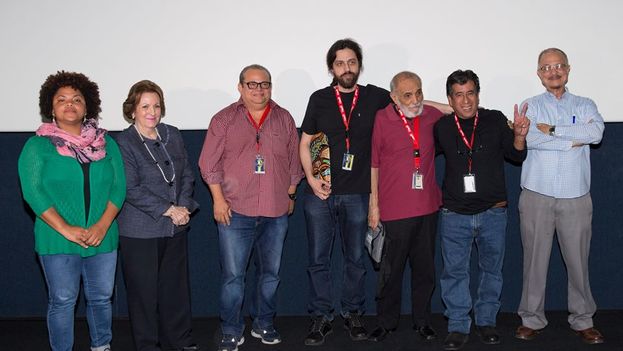




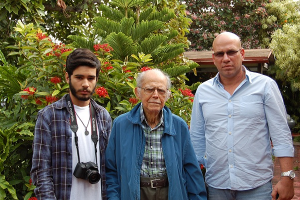
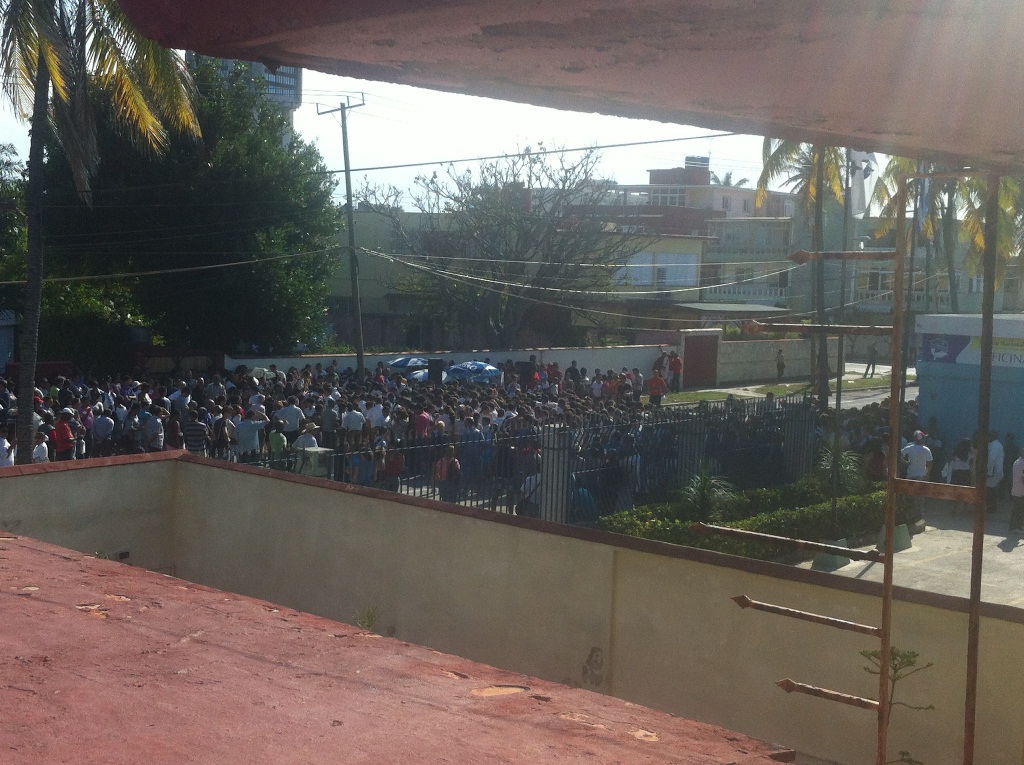
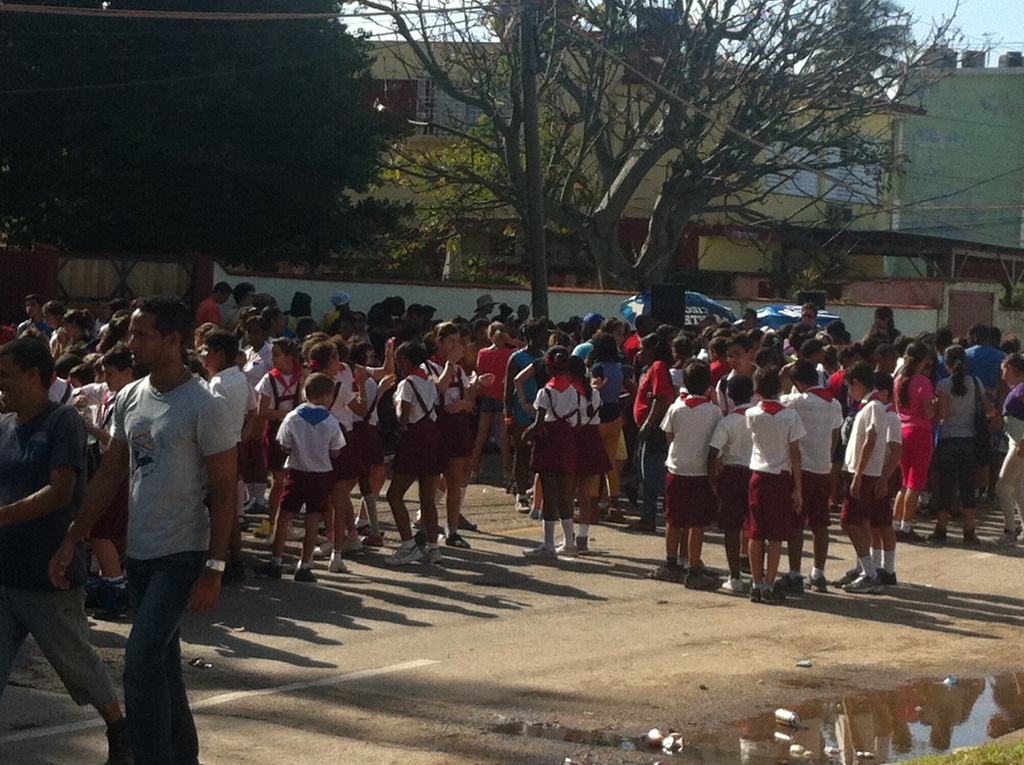
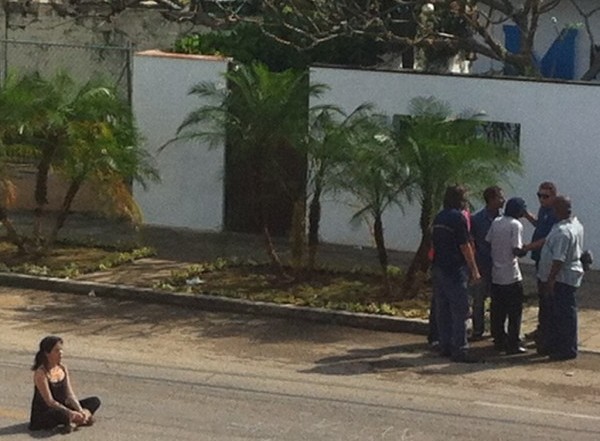
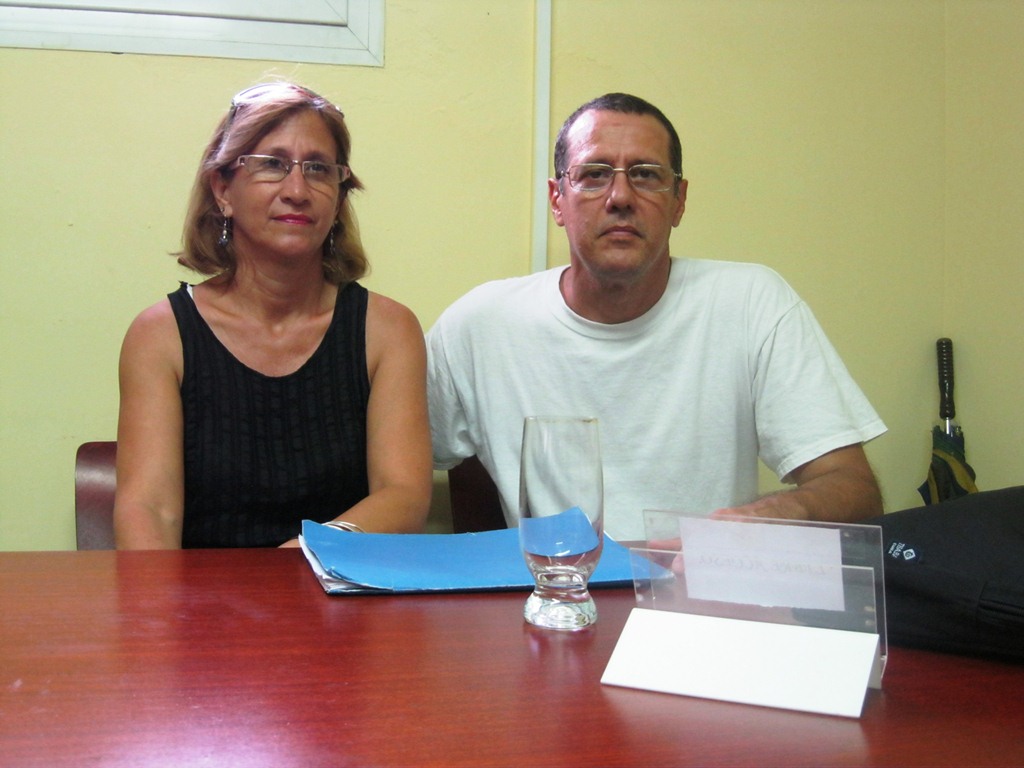

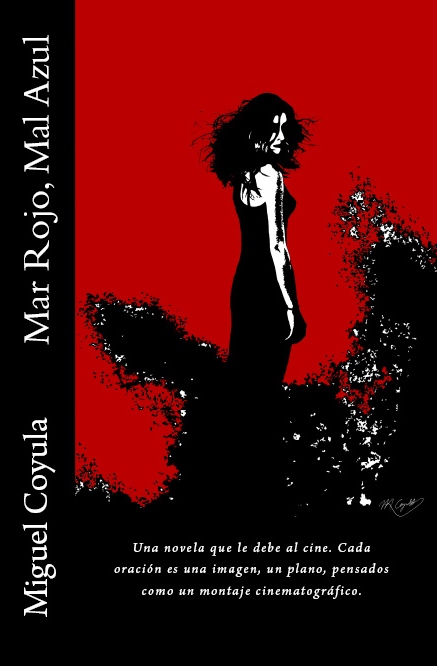


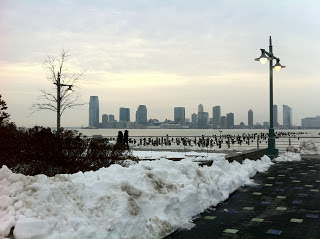
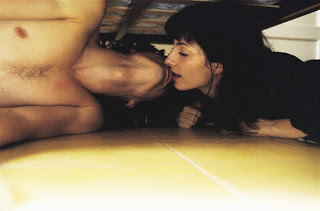
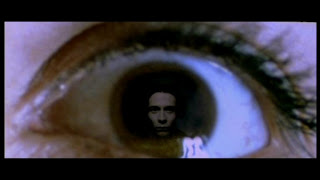


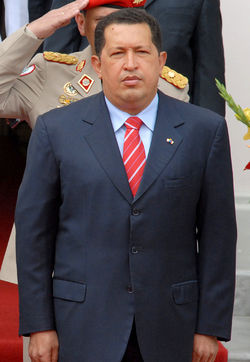

 I believe I have successfully crossed the threshold of the 21st Century, a century that I prefer to believe more inclusive, comprehensive, and cohesive. After having been educated in certain social and ideological intolerance, I’ve gotten past them. My lesbian friends — they aren’t my friends so I can be “tuned in” — rather because their friendships enrich my life. I have other friendships whose political or religious posture could make us enemies, but for a long time my values of good and evil are established according to my beliefs; no more will I leave in other hands the thinking I should be doing for myself.
I believe I have successfully crossed the threshold of the 21st Century, a century that I prefer to believe more inclusive, comprehensive, and cohesive. After having been educated in certain social and ideological intolerance, I’ve gotten past them. My lesbian friends — they aren’t my friends so I can be “tuned in” — rather because their friendships enrich my life. I have other friendships whose political or religious posture could make us enemies, but for a long time my values of good and evil are established according to my beliefs; no more will I leave in other hands the thinking I should be doing for myself.